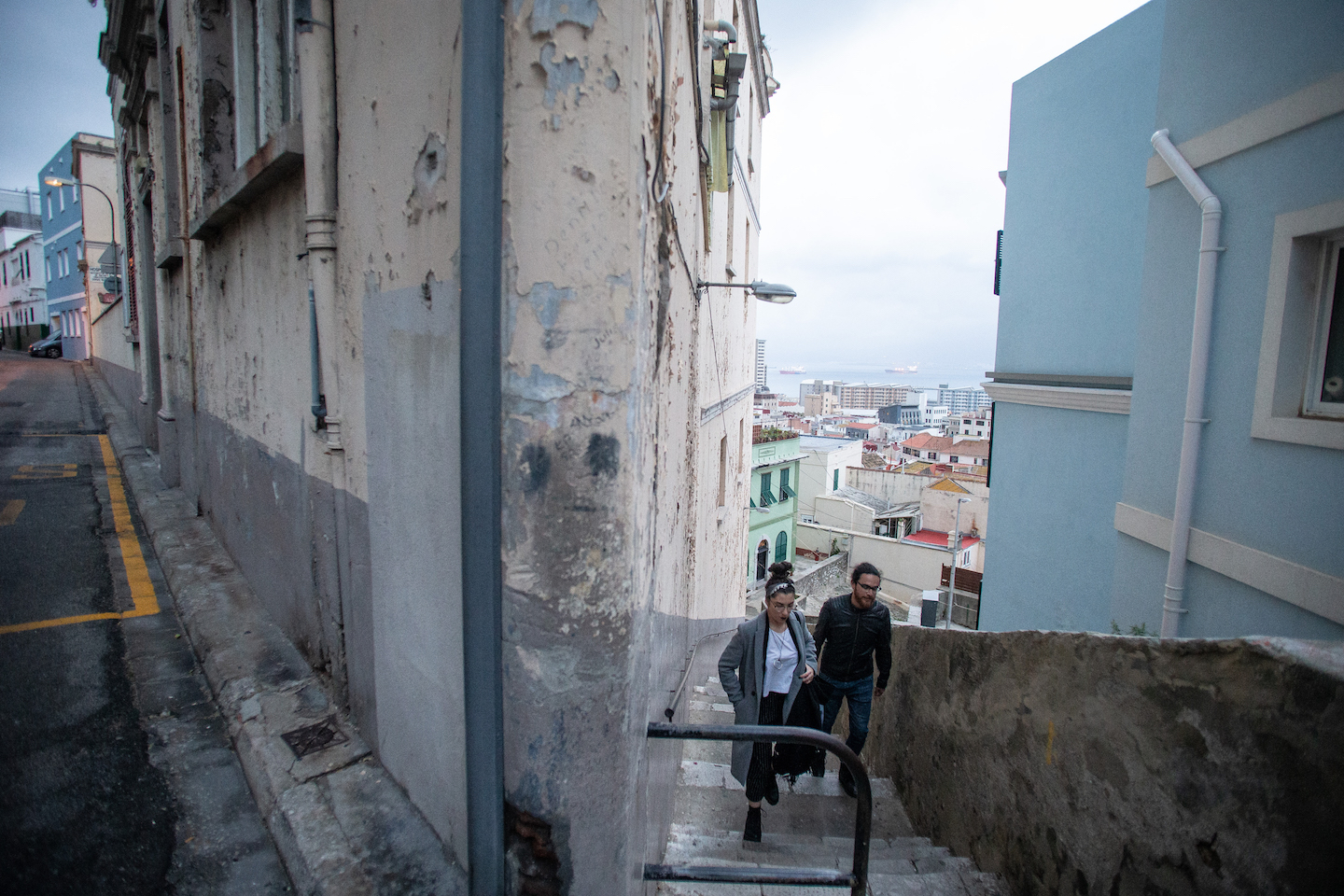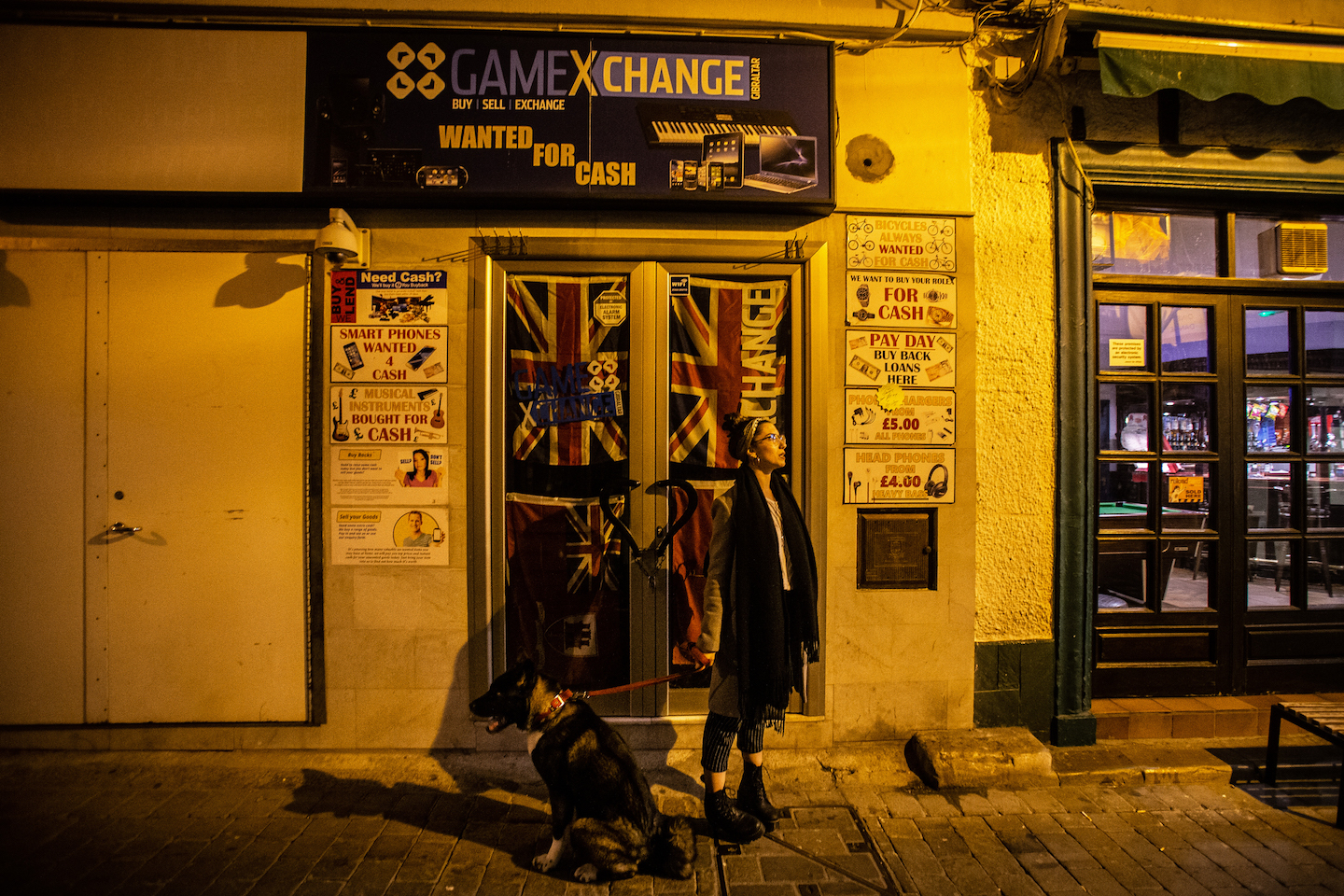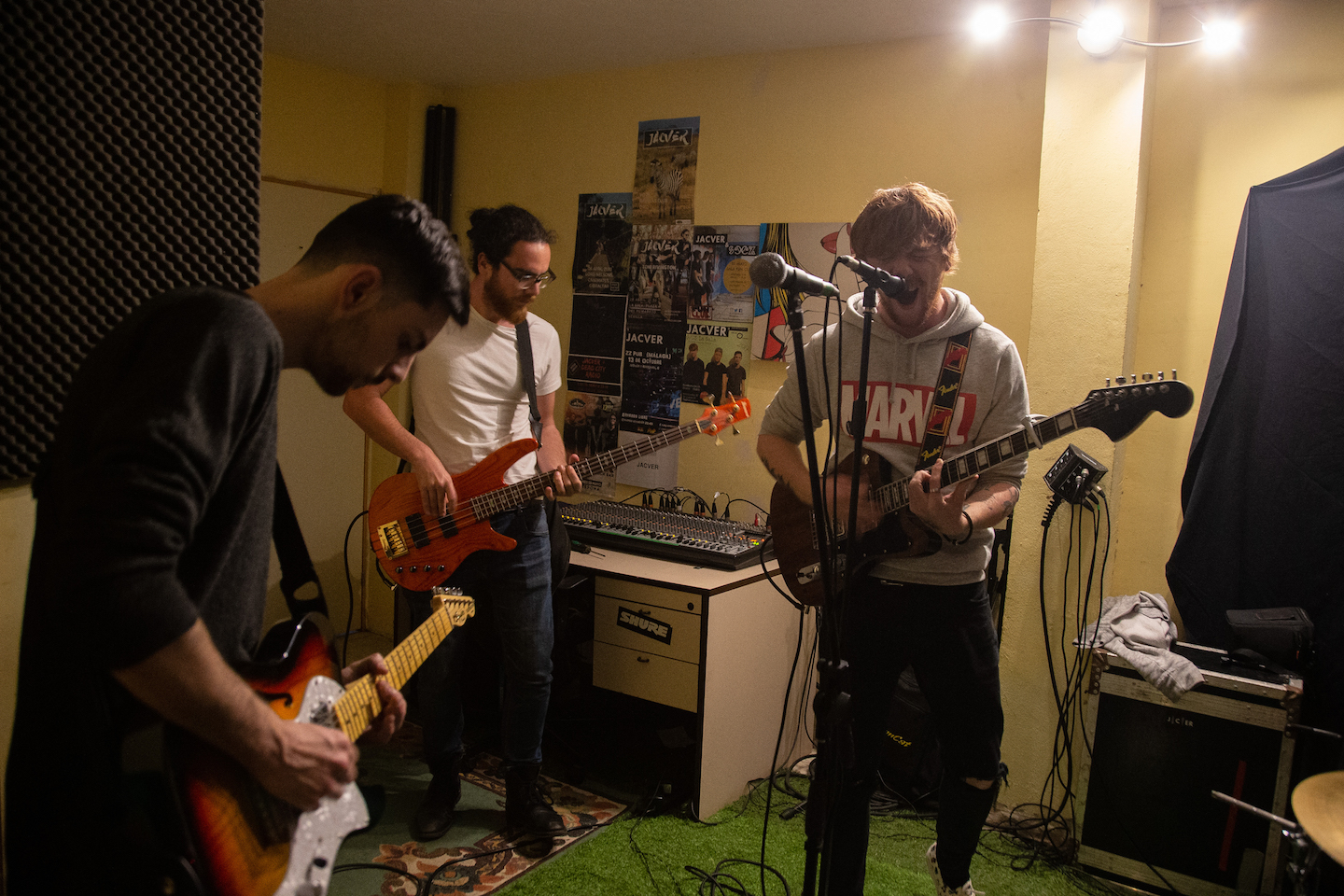On the morning of the 24th of June 2016, Gibraltarian Daniel Ghio woke up his startled girlfriend by shouting “Fuck”.
They had gone to bed when the last Brexit votes were still being counted in the UK. The final ballot count in Gibraltar had concluded quickly that night, with 95.5 percent voting to remain in the EU. “We thought that everything would be the same after we had woken up,” recalls Malena, Daniel’s partner, who’s from a neighbouring town in Spain.
Videos by VICE
But it wasn’t. Still in shock, Daniel started thinking about the queues of cars at customs, his two children, his job. He remembered when his parents told him about “the fence”, separating the British Overseas Territory of Gibraltar from the rest of mainland Spain. He never it thought would happen again. “Who knows, maybe it will,” he tells me.

Daniel is 30 and has two children – Jasmine, eight, and Jeremy, six – from a former relationship. He works as an account executive at a company that provides servers for online betting houses, a business that has spiked locally in recent years. His colleagues are mainly Spanish and Gibraltarian. In June 2019, 15,329 people crossed the border daily for professional reasons, 9.13 percent more than in the same month the previous year. Cross-border employees work in a range of occupations – construction, the service sector, maintenance, cleaning and in tech companies.
“We were all wondering what had happened. We knew it could be the same as in the US with Trump, but hoped that common sense would eventually prevail,” adds Daniel. “But that day all you could see were grieving faces.”
Neither Daniel or Malena are old enough to really remember what it was like to live through one of the darkest periods in Gibraltar’s recent history, when the border closed in 1969 and wasn’t fully re-opened until 1985. But the memories passed down from their parents came bubbling up following that Brexit result. When the fence first closed, Daniel tells me “people were given only 24 hours to decide on which side of the border they wanted to stay. In just one night, many families were separated, businesses were closed – it became a broken society.”

Gibraltar became isolated. Throughout those years, people on either side of the border had to see each other through a fence, separated by a distance of 100 metres. This is how Gibraltarians began to forge a toxic relationship with the border that separates them from Spain, often troubled with long queues and traffic jams to get in or out of the territory, as a response to the tension with the central government in Madrid. Crossing it can take a matter of minutes, or become an hour-long ordeal.
Life is very different on each side of this physical division. Both Daniel and Malena are aware of how much being born just a kilometre away could affect your life. Daniel was never a model student – he studied Audiovisual Communication at Plymouth University in the UK, though he didn’t finish his degree. Malena never had access to any college grants, so she dropped out of school and started to work as a babysitter on an hourly basis. After moving to Gibraltar with Daniel, she found her first full-time job as a waitress. Today she works at an Apple Store. “I’m positive that if I wanted to look for another job, I could find it in less than a week,” she predicts.
Malena makes £16,000 a year; Daniel’s salary is at £35 000. “A bit better than the average,” he admits, and adds that he’s never been unemployed. Every morning, the traffic at the border flows in one direction: towards the Rock.

There is no unemployment rate in Gibraltar. They just count: 44 people were unemployed during the last quarter of 2018. This situation is a mirage for the Spanish neighbours in La Línea de la Concepción, the municipality with the third highest unemployment rate in Spain, at 32.97 percent in January 2019, 18.87 points above the national average.
The data reflects Daniel and Malena’s realities. Only four out of ten of her Spanish friends have jobs, while all of Daniel’s friends are employed. “I was lucky to be so close to Gibraltar and to be able to find a job,” she says.
I find Manuel* smuggling several backpacks full of cigarettes from Gibraltar to La Línea. One hundred packets in total, for which he charges €5 per day and might face substantial fines. He has no choice as he relies on the income to support his family. He’s 27 and married with two children. He’s been unemployed for five years now, since there aren’t many job opportunities for a waiter in Spain.
“I do it because I need to,” he says. “If I had a job that earned €700 a month, I wouldn’t be doing this. Why would I risk being arrested or beaten up by the police for next to nothing? Selling this won’t save us, but we can get by.”
Despite living so close to it, he has never actually set foot in Gibraltar. The barrier that separates Gibraltar from La Línea is like a semipermeable membrane: Spaniards go to the British side to work, but not for leisure; Gibraltarians go to the Spanish side for leisure, but not for work. The high prices of the restaurants and bars in Gibraltar are prohibitive for its neighbours’ pockets – on the other hand, the exchange rate of pounds for euros makes shopping and eating out in La Línea very attractive for Gibraltarians.

Daniel remembers how as a child, he and his family regularly crossed the border to go to a Chinese restaurant in Spain, since they were too expensive in Gibraltar. From those trips into Spanish territory, Daniel understood Spain to be much poorer than Gibraltar. “I remember seeing people begging on the street; I always felt that La Línea struggled to get by,” he adds. “There are no beggars in Gibraltar, no homeless people.”
Malena thinks Daniel’s upbringing on the other side of the border was better than hers. “They indulged him in every whim, going on trips and doing things I could have never seen myself doing. The Gibraltar middle class standard of living is much higher than the Spanish one. I’m amazed at the fact that he has two children and still lives comfortably. It wouldn’t be like that in La Línea. It might not seem so, but to me that’s a privilege.”
Daniel and Malena have been together for five years. They met at a concert in Sotogrande, an expensive residential area in San Roque (Cádiz). When they decided to move in together, they wanted a house outside of Gibraltar, since the young couple couldn’t afford the high rental prices. “A place with a living room, kitchen, bathroom and bedroom could cost at least £1000 a month.”
The limited growth potential in Gibraltar pushes up housing prices and forces many Gibraltarians to live outside of the Rock. Malena and Daniel rented a four-bedroom two-storey house in a quiet area of San Roque for €700 a month. Now, due to the border access issues after Brexit, the devaluation of the pound and the fact that they want to be near the children, they have been granted social housing at an affordable rent price in Gibraltar.
Daniel regularly travels from Gibraltar to Guadiaro, 40 minutes away, to rehearse in a basement with his band, Jacver, which is made up of a Spaniard and a few Brits. I ask the rest of the band if they think the border is enriching for their music, and his bandmate Augusto shakes his head. “It might be enriching if you hang around on both sides, but people normally listen to music from one side or the other, without mixing.” Regarding Brexit, another bandmate, Harry, says he’s “fed up of politics, but I experience it through my father, and I see he’s always stressed because of Brexit, because the information is worse every day. Because we’re British but live in Spain.”

Daniel struggles to justify the vote that came out of the referendum. “We were part of the EU and still had the pound – we were fine,” he complains. “Now we’ll really understand what’s at stake. The referendum was driven by fear and lies,” he adds. I ask him what’s at stake for Gibraltar. “Gibraltar is very sensitive to what happens at the border,” he tells me. “There will be no problem as long as it’s fluid. If you generate delays, the businesses here will suffer the consequences.”
Even though the closing of the border is on every Gibraltarian’s mind, the fact that they already survived a time when it was closed helps them believe they could do it again. But if Brexit ends up choking the population of Gibraltar, Daniel and Malena are certain that they would leave the Rock, perhaps to somewhere outside of Spain. “We like London,” they say.
Daniel will always have mixed feelings about Spain. “They’re our neighbours and I have friends there,” he tells me. “The problem is the nationalism that the Spanish government encourages, which political parties also leverage to try to win votes. The hate comes from Madrid.”
I ask Malena what she thinks about Gibraltar in return. “They’ve welcomed me with open arms,” she says. “I have a stronger feeling of belonging here than in my hometown. I always say with pride that I’m from Gibraltar.”
Read more stories from VICE.com’s series about how the national borders dividing and surrounding Europe affect the lives of the people living near them.




